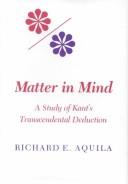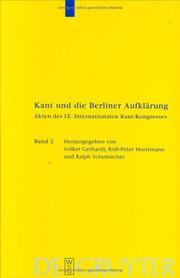| Listing 1 - 10 of 10 |
Sort by
|
Book
ISBN: 0271012285 9780271012285 Year: 1977 Publisher: University Park: Pennsylvania state university press,
Abstract | Keywords | Export | Availability | Bookmark
 Loading...
Loading...Choose an application
- Reference Manager
- EndNote
- RefWorks (Direct export to RefWorks)
Theory of knowledge --- Intentionalism --- 165.423.1 --- Act psychology --- Action psychology --- Psychology --- Intentionaliteit. Theory of meaning --- 165.423.1 Intentionaliteit. Theory of meaning

ISBN: 0253337127 Year: 1989 Publisher: Bloomington Indiana University Press
Abstract | Keywords | Export | Availability | Bookmark
 Loading...
Loading...Choose an application
- Reference Manager
- EndNote
- RefWorks (Direct export to RefWorks)
Intuition --- -Knowledge, Theory of --- -Perception (Philosophy) --- -Transcendentalism --- -Philosophy --- Philosophy, Modern --- Idealism --- Philosophy --- Epistemology --- Theory of knowledge --- Psychology --- Intuition (Psychology) --- Intuitionalism --- Cognition --- Insight --- History --- -History --- -Kant, Immanuel --- Kant, Immanuel --- -Contributions in theory of perception --- Knowledge, Theory of --- Reason --- Mind --- Kant, Immanuel, --- Intellect --- Rationalism
Book
ISBN: 0585104735 9780585104737 0253350050 9780253350053 0253176867 9780253176868 Year: 1983 Publisher: Bloomington, IN : Indiana University Press,
Abstract | Keywords | Export | Availability | Bookmark
 Loading...
Loading...Choose an application
- Reference Manager
- EndNote
- RefWorks (Direct export to RefWorks)
Knowledge, Theory of --- Philosophy & Religion --- Philosophy --- History --- Kant, Immanuel, --- Kant, Immanuel --- Kant, I. --- Kānt, ʻAmmānūʼīl, --- Kant, Immanouel, --- Kant, Immanuil, --- Kʻantʻŭ, --- Kant, --- Kant, Emmanuel, --- Ḳanṭ, ʻImanuʼel, --- Kant, E., --- Kant, Emanuel, --- Cantơ, I., --- Kant, Emanuele, --- Kant, Im. --- קאנט --- קאנט, א. --- קאנט, עמנואל --- קאנט, עמנואל, --- קאנט, ע. --- קנט --- קנט, עמנואל --- קנט, עמנואל, --- كانت ، ايمانوئل --- كنت، إمانويل، --- カントイマニユエル, --- Kangde, --- 康德, --- Kanṭ, Īmānwīl, --- كانط، إيمانويل --- Kant, Manuel, --- Knowledge, Theory of. --- Erkenntnistheorie --- Kennistheorie. --- PHILOSOPHY --- Theorie de la connaissance --- Epistemology. --- Histoire --- Kant, Immanuel. --- Kant --- Et la theorie de la connaissance. --- Erkenntnistheorie. --- Contributions in theory of knowledge. --- Mental philosophy --- Humanities --- Epistemology --- Theory of knowledge --- Psychology

ISBN: 0585101639 9780585101637 0253337127 9780253337122 Year: 1989 Publisher: Bloomington : Indiana University Press,
Abstract | Keywords | Export | Availability | Bookmark
 Loading...
Loading...Choose an application
- Reference Manager
- EndNote
- RefWorks (Direct export to RefWorks)
Knowledge, Theory of --- Intuition --- Perception (Philosophy) --- Transcendentalism --- Knowledge, Theory of. --- Reason. --- Reason --- Philosophy & Religion --- Philosophy --- Epistemology --- Theory of knowledge --- Psychology --- Mind --- Intellect --- Rationalism --- Philosophy, Modern --- Idealism --- Intuition (Psychology) --- Intuitionalism --- Cognition --- Insight --- History --- Kant, Immanuel, --- Kant, Immanuel --- Kant, I. --- Kānt, ʻAmmānūʼīl, --- Kant, Immanouel, --- Kant, Immanuil, --- Kʻantʻŭ, --- Kant, --- Kant, Emmanuel, --- Ḳanṭ, ʻImanuʼel, --- Kant, E., --- Kant, Emanuel, --- Cantơ, I., --- Kant, Emanuele, --- Kant, Im. --- קאנט --- קאנט, א. --- קאנט, עמנואל --- קאנט, עמנואל, --- קאנט, ע. --- קנט --- קנט, עמנואל --- קנט, עמנואל, --- كانت ، ايمانوئل --- كنت، إمانويل، --- カントイマニユエル, --- Kangde, --- 康德, --- Kanṭ, Īmānwīl, --- كانط، إيمانويل --- Kant, Manuel, --- Contributions in theory of perception.
Book
ISBN: 0253051789 9780253051783 0585104735 9780585104737 0253350050 9780253350053 0253176867 9780253176868 Year: 1983 Publisher: Bloomington, IN
Abstract | Keywords | Export | Availability | Bookmark
 Loading...
Loading...Choose an application
- Reference Manager
- EndNote
- RefWorks (Direct export to RefWorks)
While many works on Kant's theory of knowledge place primary emphasis on assessing the validity of Kant's arguments, Richard E. Aquila aims first at clarifying the meaning of basic claims and concepts as Kant himself understood them. Representational Mind offers an interpretation of some of the most fundamental epistemological distinctions that Kant drew: between matter and form, intuition and concept, and things in themselves and appearances. Aquila's analysis centers on a theory of consciousness as the conceptual determination of intentional objects, the structure of which is grounded in forms of intuition. This approach, which distinguishes between concepts as mere predicates of judgments and as representations that phenomenologically inform intuitions, leads to a fuller grasp of the role of conceptualization in thinking. Shedding new light on the meaning of Kant's Transcendental Aesthetic, Aquila also gives extended treatment to imag- ination and schematism. The concluding chapter is devoted to the problem of self- awareness and the flow of time . An important contribution to the dialogue between phenomenological and analytical perspectives, Representational Mind will be of interest to scholars and students concerned with the history of modern philosophy and with philosophical problems involving the nature of mind and the intentionality of consciousness.
Knowledge, Theory of. --- Kant, Immanuel, --- Epistemology --- Theory of knowledge --- Philosophy --- Psychology --- Kant, Immanuel --- Kant, I. --- Kānt, ʻAmmānūʼīl, --- Kant, Immanouel, --- Kant, Immanuil, --- Kʻantʻŭ, --- Kant, --- Kant, Emmanuel, --- Ḳanṭ, ʻImanuʼel, --- Kant, E., --- Kant, Emanuel, --- Cantơ, I., --- Kant, Emanuele, --- Kant, Im. --- קאנט --- קאנט, א. --- קאנט, עמנואל --- קאנט, עמנואל, --- קאנט, ע. --- קנט --- קנט, עמנואל --- קנט, עמנואל, --- كانت ، ايمانوئل --- كنت، إمانويل، --- カントイマニユエル, --- Kangde, --- 康德, --- Kanṭ, Īmānwīl, --- كانط، إيمانويل --- Kant, Manuel,

ISBN: 0253055849 9780253055842 0585101639 9780585101637 0253337127 9780253337122 Year: 1989 Publisher: Bloomington
Abstract | Keywords | Export | Availability | Bookmark
 Loading...
Loading...Choose an application
- Reference Manager
- EndNote
- RefWorks (Direct export to RefWorks)
Book
Year: 1989 Publisher: Indiana University Press
Abstract | Keywords | Export | Availability | Bookmark
 Loading...
Loading...Choose an application
- Reference Manager
- EndNote
- RefWorks (Direct export to RefWorks)
Elaborating a theory of consciousness that Kant made only partially explicit in the Transcendental Deduction of the Critique of Pure Reason, Richard E. Aquila offers a novel reading of Kant's theories of synthesis and conceptual rules, productive and reproductive imagination, the distinction between judgments of perception and experience, and the relations between self and objects. Aquila builds on the Transcendental Aesthetic's view of the formation of intuitional consciousness out of sensory matter and proposes a theory of concept formation, in the Transcendental Deduction, out of analogously conceived bodies of imaginative matter. Kant is seen here as offering a formidable synthesis of the purely animal and the distinctively human in human consciousness.
Book
Year: 1989 Publisher: Indiana University Press
Abstract | Keywords | Export | Availability | Bookmark
 Loading...
Loading...Choose an application
- Reference Manager
- EndNote
- RefWorks (Direct export to RefWorks)
Elaborating a theory of consciousness that Kant made only partially explicit in the Transcendental Deduction of the Critique of Pure Reason, Richard E. Aquila offers a novel reading of Kant's theories of synthesis and conceptual rules, productive and reproductive imagination, the distinction between judgments of perception and experience, and the relations between self and objects. Aquila builds on the Transcendental Aesthetic's view of the formation of intuitional consciousness out of sensory matter and proposes a theory of concept formation, in the Transcendental Deduction, out of analogously conceived bodies of imaginative matter. Kant is seen here as offering a formidable synthesis of the purely animal and the distinctively human in human consciousness.
Book
Year: 1989 Publisher: Indiana University Press
Abstract | Keywords | Export | Availability | Bookmark
 Loading...
Loading...Choose an application
- Reference Manager
- EndNote
- RefWorks (Direct export to RefWorks)
Elaborating a theory of consciousness that Kant made only partially explicit in the Transcendental Deduction of the Critique of Pure Reason, Richard E. Aquila offers a novel reading of Kant's theories of synthesis and conceptual rules, productive and reproductive imagination, the distinction between judgments of perception and experience, and the relations between self and objects. Aquila builds on the Transcendental Aesthetic's view of the formation of intuitional consciousness out of sensory matter and proposes a theory of concept formation, in the Transcendental Deduction, out of analogously conceived bodies of imaginative matter. Kant is seen here as offering a formidable synthesis of the purely animal and the distinctively human in human consciousness.


ISBN: 9783110874129 9783110169799 Year: 2014 Publisher: Berlin ;; Boston De Gruyter
Abstract | Keywords | Export | Availability | Bookmark
 Loading...
Loading...Choose an application
- Reference Manager
- EndNote
- RefWorks (Direct export to RefWorks)
| Listing 1 - 10 of 10 |
Sort by
|

 Search
Search Feedback
Feedback About UniCat
About UniCat  Help
Help News
News